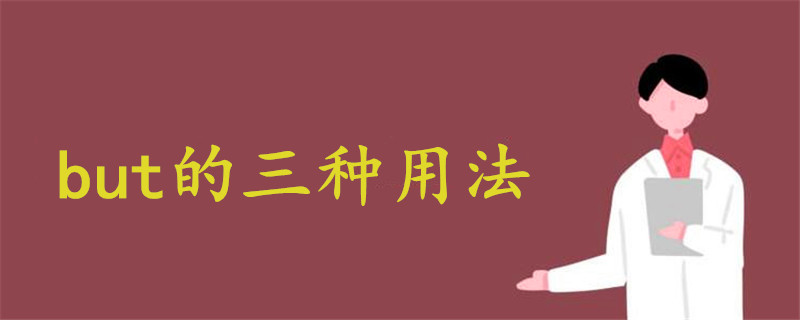but的三种用法:可作连词,含义为“但是”、“然而”、“尽管如此”,可以连接两个并列成分或两个并列分句;可作介词,含义为“除了”、“除…之外”,常与nothing/nobody等连用;还可作副词,含义为“只有”、“仅仅”。

but的中文意思及用法介绍
1、作为连词时,译为但是;而;然而;相反;尽管如此;表示歉意时说。
例句:His mother won't be there, but his father might.
他母亲不会在那里,但他父亲也许会去。
I'd asked everybody but only two people came.
每个人我都请了,却只来了两个人。
I'm sorry but I can't stay any longer.
很抱歉,我不能再待下去了。
But that's not possible!
但那是不可能的!
I had no choice but to sign the contract.
我别无选择,只好签了合同。
Nothing, but nothing would make him change his mind.
没有什么,绝对没有什么会使他改变主意。
2、作为介词时,译为除了;除…之外。
例句:We've had nothing but trouble with this car.
我们这辆车净出毛病。
Who but Rosa could think of something like that?
除了罗莎,谁会想得到那种事?
Take the first turning but one.
在第二个拐弯处转弯。
3、作为副词时,译为只有;仅仅。
例句:I don't think we'll manage it. Still, we can but try.
我想我们应付不了这事。但不妨试试。
This is but one of the methods used to try and get alcoholics to give up drink.
这只是为让那些酗酒者戒酒所尝试的方法之一。
None but God will ever know what I suffered
只有上帝知道我受过什么苦。
We had no option but to abandon the meeting.
我们别无选择,只有放弃这次会面。
Our world is but a small part of the cosmos.
我们的世界仅仅是宇宙的一小部分而已。
This is not the original picture, but just a copy of it.
这不是那幅画的原作,仅仅是它的复制品。










